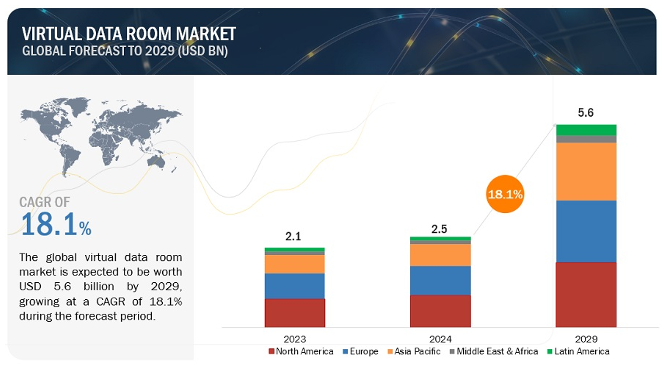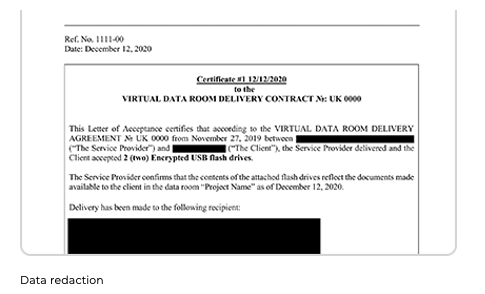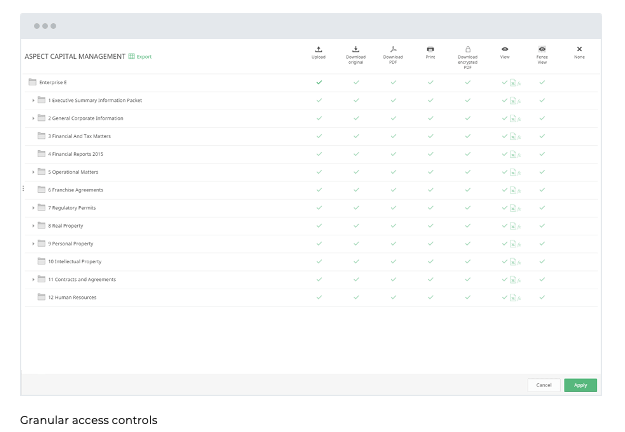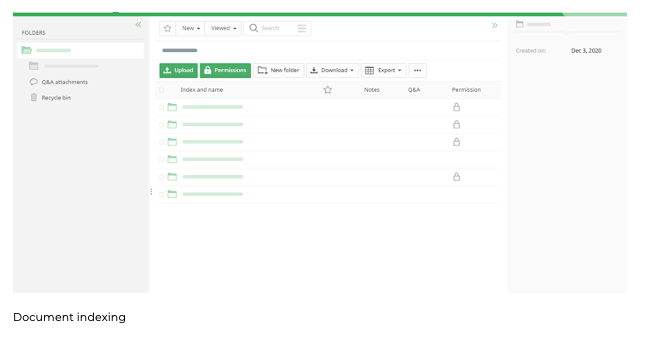With mounting pressure to streamline processes, protect sensitive information, and ensure compliance, many professionals juggle countless documents and communication threads. The stakes are high. Missing a crucial detail can lead to costly mistakes or delays in due diligence. Fortunately, there is a solution that can help ease due diligence pain points – virtual data rooms.
Explore how the solution can protect, simplify, and empower the procedure in our post!
What is a virtual data room for due diligence?
It is a highly secure online platform for data storage, document review, and collaboration between parties. The solution streamlines the process by centralizing data, controlling access to sensitive information, and providing transparency through detailed tracking and user activity reporting. Using a due diligence data room, teams improve decision-making, reduce risks, and speed up the procedure.
In addition to due diligence, other data room use cases include the following:
- Mergers and acquisitions
- Real estate transactions
- Initial public offerings
- Legal proceedings
- Intellectual property management
- Strategic partnerships

Virtual Data Room Market Size, Global Industry Share Forecast | Growth Drivers & Opportunities
How do data rooms work?
Here is a quick overview of how the solution functions, from the creation step to deal closure:
- Dataroom setup (a team sets up a data room and uploads documents in an organized structure)
- Access control (a data room admin assigns permissions to ensure only specific users can view or interact with certain files)
- Document review (authorized parties access a data room to review documents in a protected space)
- Collaboration (due diligence teams communicate, ask questions, and clarify details within the platform)
- Activity tracking (a data room admin monitors user actions and generates detailed reports to maintain transparency on file access)
- Process closure (a team closes or archives a data room for future use)
Next, we invite you to explore how the software helps teams overcome common due diligence hurdles.
What are the most common due diligence challenges?
According to legal experts, due diligence often comes with the following challenges:
1. Data availability and quality
Companies often lack organized records or may hesitate to share sensitive information. Incomplete or outdated data can lead to poor decisions, so ensuring data integrity requires significant time and resources.
✔️Virtual data room solutions:
- Centralized document management. Data rooms store all sensitive documents in one secure space, ensuring easy access and retrieval of organized records.
- Version control. This tool tracks document changes to enable access to the latest versions.
- Data redaction. Users can securely hide sensitive information within documents before sharing them.

2. Document security
Secure file-sharing and restricted data access prevent data breaches and protect confidentiality during due diligence. Failure to address these concerns usually results in unauthorized access and legal repercussions.
✔️Virtual data room solutions:
- Granular access controls. Secure data room due diligence platforms provide customizable access permissions, allowing administrators to restrict document access based on user roles.
- End-to-end encryption. The software makes documents unreadable during transmission and storage, providing robust security against unauthorized access.
- Two-factor authentication. This additional layer of security requires users to verify their identity through a second method, protecting sensitive documents from unauthorized access.

👁️🗨️Cybersecurity and Data Privacy Due Diligence (Checklists Inside)
3. Complex legal and regulatory frameworks
Companies must navigate complex laws concerning labor, environmental standards, and corporate governance, which adds to due diligence challenges.
✔️Virtual data room solutions:
- Certifications. Advanced due diligence data room providers comply with world-renowned credentials, including GDPR, HIPAA, and ISO 27001. It assures organizations that their software meets rigorous security and regulatory requirements.
- Audit trails and activity reports. Data room admins can generate detailed logs of all user activities within the platform, which can be vital for compliance reviews and audits.
4. Time constraints
Due diligence often operates under tight deadlines, leading to oversights and inadequate analysis. Therefore, teams must balance thoroughness with efficiency and prioritize critical areas without compromising quality.
✔️Virtual data room solutions:
- Intuitive user interface. A user-friendly interface allows team members to navigate data rooms quickly. Furthermore, it reduces the time spent searching for documents.
- Document indexing and categorization: Users can automatically index and categorize documents to streamline access to relevant information.
- Smart search and AI-powered tools. Virtual data rooms suggest relevant documents or keywords based on previous searches, helping teams find critical information swiftly.
- Bulk upload and automation. The software enables teams to quickly add large volumes of data without manual entry, saving valuable time.

5. Integration challenges
After the procedure, integrating findings into strategic decision-making can be difficult. Specifically, organizations often struggle to align insights with existing strategies, allocate resources effectively, and ensure that all stakeholders understand their roles in implementing changes based on the findings.
✔️Virtual data room solutions:
- Collaboration tools. Q&A modules, comment sections, and real-time chat features enable stakeholders to communicate effectively about findings and strategic implications.
- Document linking and cross-referencing. Users can link relevant documents and data points within a virtual data room, making it easier for teams to connect findings with existing strategies.
- Integrated workflow management. Teams can create and assign tasks related to implementing findings. This tool helps ensure accountability and clarity around roles and responsibilities.
- Data visualization tools. Charts, graphs, and dashboards make it easier for stakeholders to understand complex data and conduct discussions.
When choosing a solution, ensure it offers all the above functionalities. This way, you will select a platform that meets your needs.
How to choose the right due diligence virtual data room in 2024?
Here is a checklist to help you choose the best VDR due diligence solution:
1. Security features
- End-to-end encryption
- Two-factor authentication
- Document expiration settings
- Watermarking capabilities
- Audit trails and activity tracking
2. User experience
- Intuitive user interface
- Easy navigation
- Advanced search functionality
- Customizable dashboards
- Mobile accessibility
3. Document management
- Bulk upload and drag-and-drop functionality
- File versioning
- Advanced indexing
- Tagging options
- Support for multiple file types
4. Collaboration tools
- Q&A functionality
- Commenting features
- Real-time notifications for document updates
- User permissions
5. Customer support
- 24/7 customer support availability
- Dedicated account manager
- Training resources and tutorials
This due diligence data room checklist includes key software features. You can explore specific providers and identify additional functionalities your deal may need.
Final thoughts
Due diligence requires attention to detail and thorough analysis. Fortunately, a virtual data room can streamline the process, improve collaboration, and ensure secure document sharing. This way, you can do due diligence with greater confidence and efficiency.